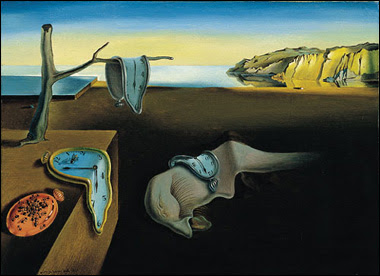The Persistence of Memory by Salvador Dali
Shuffling noises could still be heard through my semi-conscious state - some of feet, and perhaps running water. The light streaming in had me move a little right-ward, hoping to avoid the sun for just that little longer, knowing that my time was almost up; the final moments I had to catch a few more winks before the dreadful vibration would be felt in my pocket, telling me that: "It's time."
That was then, and that was when I was subjected to the hours of an OPC (off-peak car), which translates to having your car stationary from 7am to 7pm on weekdays. Being the semi-snob that I am and refusing to take the hour-long bus-ride and potentially letting my would-be students make inane jokes about my drooling state, I opted to go through a routine that required me to wake up at 5.30am everyday so that I can get to the carpark before 7am, with enough time to catch a few winks before my class at 9. Conversely, I had to tarry on after class till at least 7pm before I could start on my way home.
Case in point: The malleability of Time. In Salvador Dali's The Persistence of Time, Dali paints a surrealistic painting of melting clocks. While common interpretations have come to describe the meaning of the painting on the meaninglessness and relativity of Time, my first impression when I saw the painting was how "soft" and "flexible" time is to a person.
In the case of waking up early to make it to school before 7am is simply a matter of adjusting my body clock (and maybe a bit of the lifestyle) in exchange for saving a couple of hundred bucks a month, which on a more abstract level, comes down to re-shuffling the time schedules, allocating time meant for sleep to travelling instead, and then time meant for travelling to sleep.
A minute and common point in basic altering of one's lifestyle or rescheduling one's time perhaps, but the bigger point is how malleable can be. Ironically, time is so fixed - to the number of hours we each get a day - and yet so malleable, in which we can entirely decide how we want to spend it - use it to put in the hours in an office for a paycheck, dedicate it to honing a skill in music or sports (or games), letting it tick by in the comfort of a loved one, or simply just kill it by staring into space and letting it disappear in the void.
It is quite ironic really, when I see the youth of my students who are so desparate to find ways to kill their time, lamenting about their life and just finding ways to fast-forward it to grow up faster; and yet, as I grow older, I've grown a lot more cautious about how my time is spent, becoming increasingly particular about efficiency, and wishing I had more time in my hands, especially from that which I wasted in my youth.
In the end, Time is perhaps the only resource a person can be said to possess entirely, and one has the total freedom of how he or she would want to spend it - but the bigger dilemma is making the time count. Often, people forget just how malleable time is, allocating a "proper time" to certain things, like when it is to sleep, or to eat, or work, and are too willing to let their time and their life run on rails.
Especially true in the natural order when running too long in the rat race, where most are content to sink into a Work-Eat-Relax-Sleep routine for 5 out of 7 days of their lives, and often put everything else that can be done to a simple rhetorical question of "where to find the time?" And in the blink of an eye, days, months or even years pass by, with you wondering where all the time went and how your life passed by without you really knowing - probably lost in the the sea of consumerism and meaningless indulgence.
For me personally, I need the occasional all-nighter or meaningful vacation to remind myself just exactly how long a night is, or just how much can be done in the span of a day - to realign my perspective of Time. But more than that, I think it is important to find Meaning - first in Life, and then naturally in Time.
I always tell people that I will probably only live till 40 due to my vampiric lifestyle and bad habits. Part of it is in jest perhaps, and maybe part of it has a ring of truth; but the larger part of it is often to remind myself to make my days and years count. Perhaps with the constant scarcity looming overhead, I will be more cautious of how I want to spend my time, how to get the most out of it, drive me towards thinking a bit harder about realising what I want in life, and I want to achieve by the end of it - especially if it could be just 10 years or so away.
.

